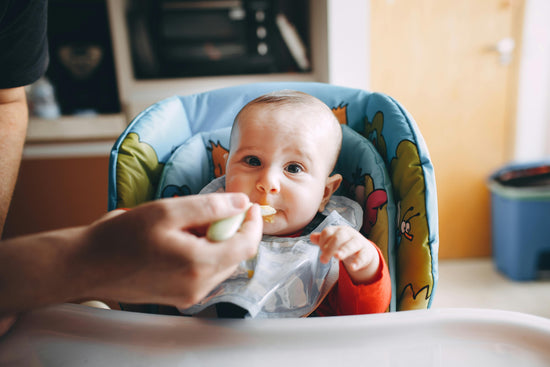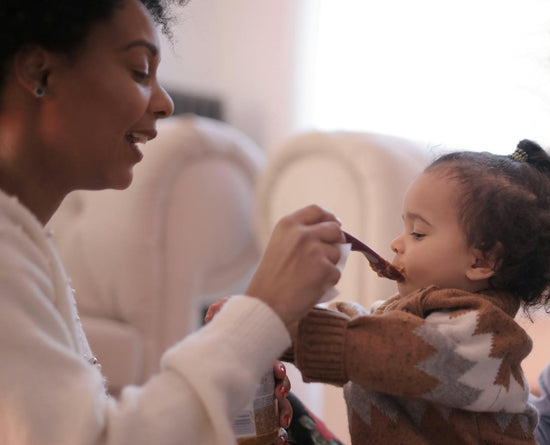Introduction To Iron Deficiency In Babies
At Mother Nurture, we are passionate about complete baby nutrition. And so we are not just saying this because it sounds alarming and should have you reading right through this article.
We are saying this because it is alarming and here are some references for you to check this fact out first.
-
While iron is one of the most essential nutrients for babies, it is deficient in babies under 23 months of age,in 80% of Indian babies!*
- According to an NLM study**, anaemia affects approximately 69% of Indian children ages of 6 to 12 months, and this specific anemia caused by Fe (Iron) deficiency.
Needless to say this is quite concerning to us here at Mother Nurture, since we are aware of the benefits of iron in baby diets.
In case you need a refresher on those, here are the reasons why iron-rich foods should be a part of your baby’s diet and why iron is just so important in the early stages of growth and development.
The Importance of Iron In Baby Diets***
- Iron is a key component of hemoglobin, the red blood cell protein that transports oxygen through the blood to every body part, every body cell. A healthy body and healthy mind requires healthy cellular growth and repair, and hence this is one of the most important functions of iron.
- Scientific studies have concluded that an iron deficiency during the early stages of development may lead to children facing learning difficulties and facing cognitive delays during later childhood. Iron is a very important nutrient for brain development and iron deficiencies show a significant correlation with learning, memory, and concentration issues.
- Iron is also important for building a study immune system that can fight off illnesses and infections without frequent outside intervention in the form of allopathic medicines. Early iron deficiencies leaves your children with significantly weaker immunities.
- Iron also supports muscle development in babies, leaving them agile and capable when tackling physical activities as they grow.
- Prolonged iron deficiencies can lead to anemia, which affects your child’s energy levels. Anemia causes fatigue and tiredness due to the drop in cellular oxygen provisions.
- Prolonged iron deficiencies can cause physical developmental delays as well, just as they affects cognitive development.
- Iron deficiency is also linked to sleep quality and studies have shown restless and disruptive sleep patterns in babies with iron deficiencies.
- Just as iron deficiencies affect immunity, they also significantly lower your baby’s natural temperature regulation, making them more susceptible to feeling cold.
All in all, iron is responsible for your baby’s overall health and well-being since it impacts several vital functions during and after your baby’s growth stage.
That said now, how can you help your baby get the right amount of iron from his or her daily diet?
Your baby should definitely not be part of that 82% statistic, and so here’s what you can do.
List of Iron-Rich Food For Babies
If your baby is predominantly home-fed and fed fresh, home-cooked meals, you can try adding these iron-rich ingredients to your baby’s meals:
- Meat and Poultry such as chicken and turkey.
- Fatty fish like salmon and tuna. (after 10 months of age due to potential allergy concerns)
- Legumes such as lentils, beans, and chickpeas.
- Dark leafy greens like spinach.
- Tofu.
Try to pair these with foods rich in Vitamin C, since vitamin C aids in better absorption of dietary iron, and limit cow’s milk as it interferes with iron absorption. (breastmilk and formula are fine)
Mother Nurture Iron Rich Wholesome Cereals
If your child is also fed fortified cereals and ready-made baby foods, choose clean-label, preservative-free options such as the baby foods offered by Mother Nurture.
Mother Nurture’s baby foods and cereals contain only natural ingredients and are suitable for both babies and toddlers.
They are also made using Indian heritage foods, such as millets like ragi, and incorporate rich nutrients that have stood the test of time in our food culture.
Check out wide variety of wholesome Mother Nurture’s iron rich cereal millets.

Sources For This Article-
*Nature- Determinants of Childhood Anemia In India
**National Center for Biotechnology Information- Micronutrient-fortified infant cereal improves Hb status and reduces iron-deficiency anaemia in Indian
*** Other Sources-
Nutrition Therapy Institute- Childhood Nutrition Ages 1-5 Years Old
Danone Nutricia Academy- Infant Growth Assessment
Danone Nutricia Academy- Beyond Brain Development Understanding The Role of Dha Ara During Infancy
Danone Nutricia Academy- Significance of Dietary Iron In Complementary Feeding
Danone India- Iron Rich Foods
Pubmed- The prevalence and impact of restless legs syndrome on patients with iron deficiency anemia
Pubmed- A Short Review of Iron Metabolism and Pathophysiology of Iron Disorders
Centers For Disease Control (CDC)- Recommendations to Prevent and Control Iron Deficiency in the United States





